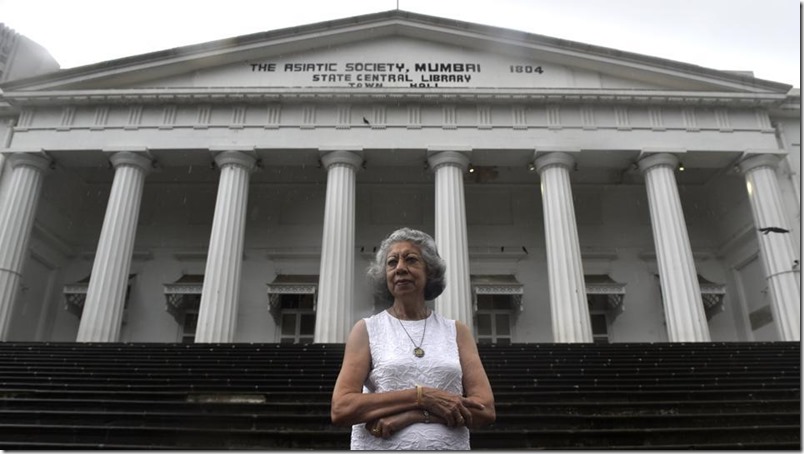Vispi Balaporia wants to ensure ongoing projects are completed – most crucial being the digitisation drive.
For the first time in its 215-year-old history, a woman has been appointed as the president of the Asiatic Society of Mumbai.
Elections for the head post of the historical institution are held every three years and a person can serve only two terms.
The daughter of Shavax Lal, who worked as secretary to Dr Rajendra Prasad, the first President of India, Balaporia retired as the Head of the Department of English, and vice-principal of Jai Hind College. Currently, she is a visiting faculty at the BMM Department of Jai Hind College.
Talking to Mirror, the acclaimed academician stressed on the importance of ensuring the completion of ongoing projects and generating funds.
“Several projects depend on the generosity of donors; such as the conservation of old and rare books, as well as a large collection of old maps that require restoration. Experts who undertake such specialised work need to be paid. Then, there are infrastructural improvements as well, for which plans are ready, but permissions have to be obtained and funding sought.”
One such project that she hopes to finish is the digitisation drive initiated by her predecessor Sharad Kale, who just finished a six-year tenure as president.
The drive was launched with a Rs 5 crore aid granted by the state government in 2015.
“The first phase of this massive project has been completed, but much remains to be achieved,” she said.
The literary institution’s web portal ‘Granth Sanjeevani’ has made it possible for scholars and researchers worldwide to access the ‘wealth of information and academic resources’ available at the institution.
“Digital is the buzzword these days, and we must keep up with the times, even though we are 215 years old.”
Balaporia, who is a trustee at Sir Jamsetjee Jeejeebhoy Parsee Benevolent Institution, also holds the position of an advisor at the Byramjee Jeejeebhoy Parsi Charitable Institution, apart from being a member of the ‘Association of British Council Scholars’.
Her MPhil dissertation was on ‘designing a writing course for undergraduate students with a low level of proficiency in English.’
The recipient of the best teacher (University of Mumbai) award in 1999, she also emphasised the need to attract young members who will carry the ‘legacy of this society forward’.
Balaporia has done her schooling from the Convent of Jesus & Mary in Delhi and La Châtelainie in Neuchatel, Switzerland. She also holds a General Certificate of Education from Oxford University (1956) along with graduate and post-graduate degrees.
Along with Balaporia, the society also elected Meenal Kshirsagar, Yogesh Kamdar, Shehernaz Nalwalla and Vithal C Nadkarni as vice-presidents. Surendra Kulkarni is the new secretary. Additionally, five members have been elected for the vacant seats on the managing committee. They include Mangala Sirdeshpande and Sanjeevani Kher.
Mumbai’s Asiatic society’s first woman president to focus on going digital, connecting with youth
Originally the Literary Society of Bombay, it was set up by the British colonial government to gather, systematise and disseminate knowledge of India and ‘the Orient’. Today, the focus is on connecting with a new generation, and taking their collection digital — initiatives that Balaporia will now oversee.
Article by Madhushree Ghosh | Hindustan Times
For the first time ever, the Asiatic Society of Mumbai has a woman president. Vispi Balaporia, 78, a life-long educator, former head of the English department and former vice-principal of the city’s Jai Hind College, will now head the iconic 215-year-old institution.
Originally the Literary Society of Bombay, it was set up by the British colonial government to gather, systematise and disseminate knowledge of India and ‘the Orient’. Today, the focus is on connecting with a new generation, and taking their collection digital — initiatives that Balaporia will now oversee.
In that collection are rare and precious books, manuscripts, maps, journals, government publications and exhaustive reports going back centuries — to the early years of modern India.
While elated about her appointment — “I got so much support from the members as they voted me in by a big majority” — Balaporia says the elation subsided somewhat when she began to think of the huge responsibility, and the negligible funding at hand.
Electing a woman president is something that should have happened sooner, she says. “I don’t know why it didn’t, given that we have had so many women vice-presidents over the years.”
In the immediate future, the Society plans to make its social media presence more prominent, especially on Facebook and Instagram. Along with digitisation, Balaporia wants to focus on the conservation and restoration of the rare books and maps in their original form too. But what they need in order for any of this to happen, she says, is a lot more money. “We get a grant from the Ministry of Culture in Delhi but we desperately need more funding,” she says.
The Asiatic Society’s digitisation project was started with ₹5 crore from the state government, in 2015. “Our web portal Granth Sanjeevani has made it possible for scholars and researchers worldwide to access the wealth of information and academic resources available at the institution. This project took off well and we’re all set to start the second phase,” Balaporia says. “We have run into a bit of a legal tangle over tenders. I hope that will clear up soon.”
About four years ago, former vice-president of India Hamid Ansari visited the library and was so impressed that he formed a review committee that recommended that if the society was to progress, there should be a grant of ₹50 crore, Balaporia adds. “Nothing has come of that so far.”

